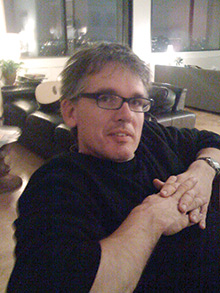David Poeppel ’90, PhD ’95
David Poeppel learned multiple languages while growing up in Munich, and today he focuses on studying language processing in the brain. But it wasn’t his childhood experience that influenced his career choice, he says. Rather, it was hearing Noam Chomsky lecture while he was studying the visual system as an undergrad at MIT. “It was like opening a curtain,” he says. “Chomsky said we should study language the way we study any scientific problem—as part of the natural world. Imagine studying language like the visual system or the kidney; the same rules apply. It was unbelievably illuminating.”

Inspired, Poeppel stayed at MIT to complete a PhD in cognitive neuroscience. After a postdoctoral fellowship at the University of California, San Francisco, he taught at the University of Maryland, College Park, for 10 years before heading to New York University as a professor of psychology and neural science. His lab now includes a dozen researchers from around the world who study hearing, speech, language, and the ways the brain processes those types of input. “The mechanisms are very small and detailed, and we approach them with an almost insulting level of coarseness,” he says. “It’s a gnarly problem.”
Hashing out that problem on a blog called Talking Brains, Poeppel and his colleague Greg Hickok have become neuroscience celebrities. Topics range from new research developments to the difficulties of conducting government-funded research during shutdowns and sequesters.
Poeppel learned to feel comfortable speaking up as a grad student at MIT. “Our professors were these famous people, but it was fine for us to sit around and say ‘I think you are misguided,’” he recalls. “I hope to have that in my lab—that atmosphere where you can say anything.”
As an MIT undergrad, Poeppel participated in Drama Shop and the Shakespeare Ensemble and played squash. His connection to the Institute actually predated his own student days: he attended MIT day camp from the ages of six to nine, when his dad did postdoctoral work in psychology. “I never thought when I walked alone through the Infinite Corridor to my dad’s office for a ride home that one day I’d be studying at MIT,” he says. But he ended up transferring from Bowdoin as an undergrad at the urging of inventor Edwin H. Land, a longtime friend of Poeppel’s parents. “He said I would have a lot of joy and learn a lot of stuff,” Poeppel recalls. “He talked me into it. And he was right.”
Keep Reading
Most Popular
Large language models can do jaw-dropping things. But nobody knows exactly why.
And that's a problem. Figuring it out is one of the biggest scientific puzzles of our time and a crucial step towards controlling more powerful future models.
The problem with plug-in hybrids? Their drivers.
Plug-in hybrids are often sold as a transition to EVs, but new data from Europe shows we’re still underestimating the emissions they produce.
Google DeepMind’s new generative model makes Super Mario–like games from scratch
Genie learns how to control games by watching hours and hours of video. It could help train next-gen robots too.
How scientists traced a mysterious covid case back to six toilets
When wastewater surveillance turns into a hunt for a single infected individual, the ethics get tricky.
Stay connected
Get the latest updates from
MIT Technology Review
Discover special offers, top stories, upcoming events, and more.